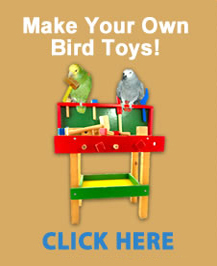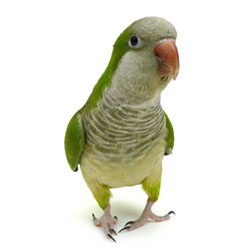 In the wild, parrots have relatively unlimited opportunities to move within their environment, eat when hungry, forage for their favorite delectable, choose their mates and their living quarters, decide when to bathe, when to fly, etc. These natural activities take up the majority of their day. Clearly, parrots did not evolve to spend their lives in a cage or to be limited in their choices. Wild instincts still rule even though most of our birds have been bred and raised in captivity. Thankfully, parrots are extremely adaptable and do a great job at existing within our world. Their adaptability, however, doesn't mean that living in our world isn't a significant source of stress to our birds.
In the wild, parrots have relatively unlimited opportunities to move within their environment, eat when hungry, forage for their favorite delectable, choose their mates and their living quarters, decide when to bathe, when to fly, etc. These natural activities take up the majority of their day. Clearly, parrots did not evolve to spend their lives in a cage or to be limited in their choices. Wild instincts still rule even though most of our birds have been bred and raised in captivity. Thankfully, parrots are extremely adaptable and do a great job at existing within our world. Their adaptability, however, doesn't mean that living in our world isn't a significant source of stress to our birds.
The Danger of Stress
Stress is a physiological reaction to a real or perceived threat. Stress causes a release of hormones that temporarily alters the physical body. This is called the "fight or flight" response. The biological purpose of the hormone release is to heighten awareness, increase strength and activate the immune system to deal with potential injury. When the perceived source of stress is eliminated the biological systems normalize. In situations of chronic stress however, the hormone levels remain high and eventually the immune system becomes impaired which can result in disease and early death.
Sources of Stress
Fortunately, the possibility of stress related health problems can be reduced by careful evaluation and enrichment of their environment. Observation is the key to knowing what is causing stress for your parrot. What is stressful to one bird may not be stressful to another and things that seem relatively minor to us may cause great stress for your bird such as the movement of a ceiling fan or the flickering of a light. Once you can identify the cause of the stress then you can work towards eliminating that source. Common sources of stress include:
- Lack of mental stimulation (boredom)
- Lack of adequate exercise
- Loneliness or lack of interaction with human flock
- Poor nutrition
- Irregular and/or unnatural feeding times
- Poor socialization and lack of behavioral guidance (not knowing how to fit into the human flock)
- Inappropriate cage placement
- Lack of sleep
- Exposure to untrained children, abusive humans and/or pets
- Environmental changes (a move, new cage, new person in home, new eyeglasses on owner)
- Poor environment (cage too small, smoke, noise, emotional stress within family, poor hygiene)
- Loss of owner or mate
- Illness
- Molting
- Nail, wing or beak trimming
Signs of Stress
Individual birds exhibit signs of stress in many different ways. Some of the most common signs are:
- Feather picking or self-mutilation
- Phobic behavior
- Poor appetite
- Inactivity
- Frozen posture
- Personality change
- Easily startled
- Changes in droppings (may also be a sign of illness)
- Uncontrolled aggression
- Screaming
- Obsessive behavior
- Trembling
Reducing Stress
There are many actions we can take to ensure our birds remain healthy and free from undue stress while living within our families. For example:
- Provide a nutritious and varied diet.
- Make sure your parrot has access to food and clean water throughout the day.
- Provide plenty of interesting toys for mental and physical stimulation.
- Provide opportunities for exercise.
- Provide opportunities for foraging.
- Heighten their sense of security by establishing predictable routines and rituals around feeding, bathing, bedtime, social time, morning and after-work greetings and goodbyes.
- RESPECT their needs and desires. Don't force your bird to do something he doesn't want to do.
- Never intimidate or punish a bird.
- Place their cage in a non-threatening location.
- Note things and situations that scare your bird (perhaps vacuum hoses, hats, helium balloons, noises, movement of large objects, etc.) and remove them from the environment to the extent possible.
- Give your birds an opportunity for fresh air and sunshine in an outdoor aviary (Note: be aware of potential outdoor hazards).
- Interact one-on-one with your bird daily and include him in your daily activities to the extent possible.
- Play games and laugh with your bird.
- Have a sleep cage available in another quiet room and make sure that your parrot companion receives plenty of restful sleep.
- Purchase a grooming perch to minimize the frequency of nail trims.
- Play soothing music.
- Keep your emotions in check; birds are very empathic and in-tune with our moods.
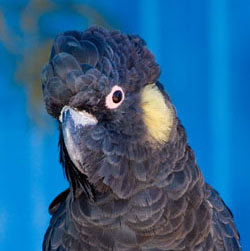 In the event of an emergency, it is important and reassuring to have a properly stocked avian first aid kit on hand. Many minor emergencies can be handled effectively at home if the proper supplies are available. In the event of a more serious situation, the kit can be helpful in stabilizing your bird prior to transport to the vet's office.
In the event of an emergency, it is important and reassuring to have a properly stocked avian first aid kit on hand. Many minor emergencies can be handled effectively at home if the proper supplies are available. In the event of a more serious situation, the kit can be helpful in stabilizing your bird prior to transport to the vet's office.

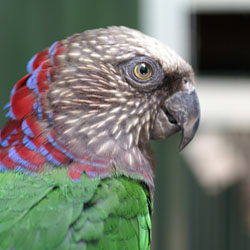 If you have a sick or injured bird there are steps that you can take to help stabilize their condition until you can get them to an avian vet. DO NOT delay in taking action!
If you have a sick or injured bird there are steps that you can take to help stabilize their condition until you can get them to an avian vet. DO NOT delay in taking action!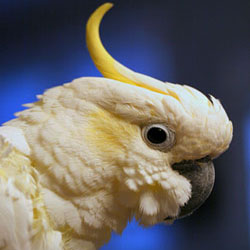 Many veterinarians have not taken the coursework necessary to provide sound medical care to our avian companions. Avian medicine is a specialty and a bird's anatomy and physiology is vastly different from that of dogs and cats. If you own a bird, one of the most critical things you can do to ensure their health is to find a qualified avian veterinarian to provide advice and specialized care.
Many veterinarians have not taken the coursework necessary to provide sound medical care to our avian companions. Avian medicine is a specialty and a bird's anatomy and physiology is vastly different from that of dogs and cats. If you own a bird, one of the most critical things you can do to ensure their health is to find a qualified avian veterinarian to provide advice and specialized care.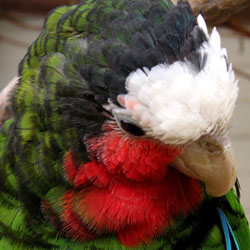 Your bird's poop is valuable in providing insight into your bird's health status. A change in the droppings can be your first gauge that something is wrong with your parrot companion.
Your bird's poop is valuable in providing insight into your bird's health status. A change in the droppings can be your first gauge that something is wrong with your parrot companion. 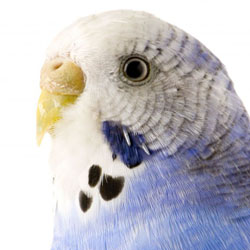 The single most important goal you should have as a responsible parrot owner is to ensure that your bird lives a long, happy and healthy life. The first step to take is to educate yourself and your family about all aspects of bird care. Hopefully, by exploring the info provided in the AvianEnrichment site, you will have a sound overview of the many key physical, emotional and instinctual needs of parrots and how best to address them. Regarding bird's physical health, the basic areas you must address include:
The single most important goal you should have as a responsible parrot owner is to ensure that your bird lives a long, happy and healthy life. The first step to take is to educate yourself and your family about all aspects of bird care. Hopefully, by exploring the info provided in the AvianEnrichment site, you will have a sound overview of the many key physical, emotional and instinctual needs of parrots and how best to address them. Regarding bird's physical health, the basic areas you must address include: In the wild, parrots have relatively unlimited opportunities to move within their environment, eat when hungry, forage for their favorite delectable, choose their mates and their living quarters, decide when to bathe, when to fly, etc. These natural activities take up the majority of their day. Clearly, parrots did not evolve to spend their lives in a cage or to be limited in their choices. Wild instincts still rule even though most of our birds have been bred and raised in captivity. Thankfully, parrots are extremely adaptable and do a great job at existing within our world. Their adaptability, however, doesn't mean that living in our world isn't a significant source of stress to our birds.
In the wild, parrots have relatively unlimited opportunities to move within their environment, eat when hungry, forage for their favorite delectable, choose their mates and their living quarters, decide when to bathe, when to fly, etc. These natural activities take up the majority of their day. Clearly, parrots did not evolve to spend their lives in a cage or to be limited in their choices. Wild instincts still rule even though most of our birds have been bred and raised in captivity. Thankfully, parrots are extremely adaptable and do a great job at existing within our world. Their adaptability, however, doesn't mean that living in our world isn't a significant source of stress to our birds. 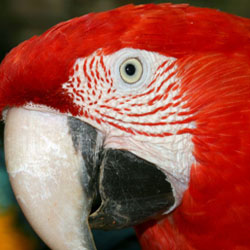 In the wild, displaying any sign of illness is not beneficial to a bird. It is instinctually very important, as a matter of survival, for a bird to disguise sickness. Often, a flock will abandon or drive off a sick bird. Birds that appear weak or ill become easy targets. Unfortunately, the instinct to hide illness also carries over to pet birds and once we notice any sign of illness it usually indicates they have already been sick for some time.
In the wild, displaying any sign of illness is not beneficial to a bird. It is instinctually very important, as a matter of survival, for a bird to disguise sickness. Often, a flock will abandon or drive off a sick bird. Birds that appear weak or ill become easy targets. Unfortunately, the instinct to hide illness also carries over to pet birds and once we notice any sign of illness it usually indicates they have already been sick for some time.
